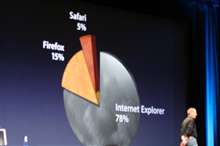The browser wars may be heating up, as Apple announces they are bringing the 3.0 version of their browser, Safari, to Windows. The software is being released today for 10.4, the 10.5 beta, and Windows Vista and XP. This also marks the first time that a new version of Safari has been released for a Mac OS X different from the one it was developed for.
 Apple's Steve Jobs introduced the move by noting that Safari's market share, by some measures, has grown to 5 percent. Given that this is a larger percentage of the worldwide computer market than Apple computers occupy, that 5 percent was likely to represent a ceiling, one which might limit the prospect of web developers ensuring Safari compatibility. By bringing Safari to Windows, Apple hopes to expand the browser's audience and ensure that it plays nicely with more of the Web moving forward.
Apple's Steve Jobs introduced the move by noting that Safari's market share, by some measures, has grown to 5 percent. Given that this is a larger percentage of the worldwide computer market than Apple computers occupy, that 5 percent was likely to represent a ceiling, one which might limit the prospect of web developers ensuring Safari compatibility. By bringing Safari to Windows, Apple hopes to expand the browser's audience and ensure that it plays nicely with more of the Web moving forward.
Apple clearly also hopes that Safari-compatible web apps attract a larger following because these will be the only ways for third-party developers to get onto the iPhone. Jobs announced that any third-party applications that wish to get onto an iPhone will have to go through Safari to get there. Even if the Windows versions of Safari don't gain any significant traction, they should at least offer developers a chance to test their wares without having to invest in a Mac.

Safari on Windows XP
Jobs demoed some of Safari's new features, which included movable tabs: they can now be torn off to create independent windows or rearranged within their current window. He also showed a series of HTML and Javascript benchmarks that showed the browser handily beating both Firefox and Internet Explorer.
 It's hard to tell how the Windows versions will be structured. The foundation of Safari is the WebKit project, which is in turn a wrapper for the KHTML browser engine. KHTML makes heavy use of a cross-platform toolkit called QT. Much of Apple's work with Safari has involved removing QT dependencies and making it play nice with ObjectiveC.
It's hard to tell how the Windows versions will be structured. The foundation of Safari is the WebKit project, which is in turn a wrapper for the KHTML browser engine. KHTML makes heavy use of a cross-platform toolkit called QT. Much of Apple's work with Safari has involved removing QT dependencies and making it play nice with ObjectiveC.
To get Safari to run on Windows, Apple could either have relied on QT or taken advantage of the Windows ObjectiveC runtime they inherited from NeXT. Rumor has it that part of the iTunes display engine relies on WebKit, so it's possible that they simply leveraged whatever had been done there. It's also possible that they've received some help on this from interested Windows developers, as WebKit appears to have attracted a larger developer community than most of Apple's other open-source efforts.
All of these questions will ultimately be answered by whatever code appears on the WebKit site.

reader comments